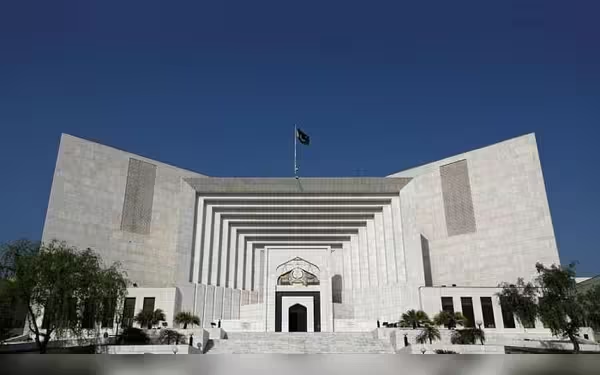Thursday, July 4, 2024 05:55 PM
Supreme Court scrutinizes ECP's reserved seat allocation
- Chief Justice Qazi Faez Isa leads significant case on reserved seats
- Discussion focuses on ECP's authority and party affiliations
- PTI and SIC contest ECP's reserved seat allocation decisions
 Image Credits: thenews
Image Credits: thenewsThe Supreme Court, led by Chief Justice Qazi Faez Isa, examines the Election Commission of Pakistan's reserved seat allocation, focusing on party affiliations, intra-party elections, and fairness in distribution to strengthen democracy.
The Supreme Court, under the leadership of Chief Justice Qazi Faez Isa, recently presided over a significant case concerning the allocation of reserved seats by the Election Commission of Pakistan (ECP). The court's focus was on the ECP's authority to designate independent candidates based on its reserved seat allocation formula, with Justice Ayesha Malik highlighting this key aspect. The discussion delved into party affiliations and intra-party elections, with a specific emphasis on the Pakistan Tehreek-e-Inaf (PTI) and the Sunni Ittehad Council (SIC).
During the proceedings, it was brought to light that the PTI had failed to conduct intra-party polls within the stipulated timeframe. Concerns were raised regarding the ECP's actions in allocating reserved seats to various parties, including the Balochistan Awami Party (BAP). The court underscored the necessity of ensuring a fair distribution of seats among all political entities.
As a result of the hearing, the ECP was instructed to furnish details regarding the reserved seats allocated in 2024 along with the corresponding allocation formula. The issue stemmed from PTI-backed independent candidates losing reserved seats in both the National Assembly and provincial assemblies. The SIC contested the ECP's decision to withhold reserved seats from them, leading to a legal dispute that eventually reached the Supreme Court.
Representing the federal government, the Attorney General of Pakistan argued against granting reserved seats to the SIC, advocating for seat allocation based on a party's electoral performance. Additionally, the PTI sought to intervene in the case, alleging that both PTI and SIC had been unjustly denied reserved seats despite meeting the eligibility criteria.
The Supreme Court's deliberations on the reserved seat allocation issue have shed light on the complexities surrounding party affiliations, intra-party elections, and the ECP's role in ensuring fairness in seat distribution. The case serves as a reminder of the importance of upholding transparency and equity in the electoral process, ultimately aiming to strengthen democracy in Pakistan.













